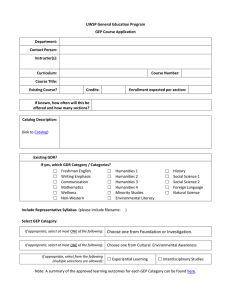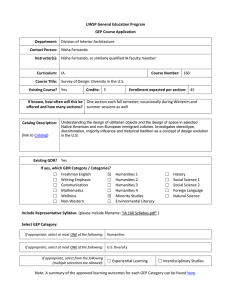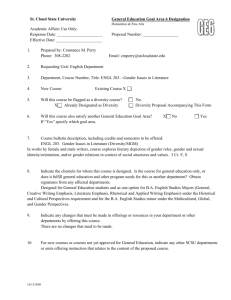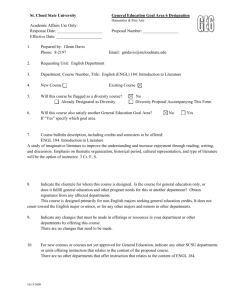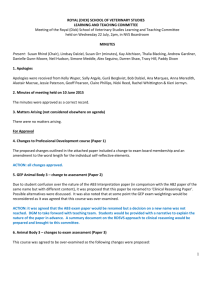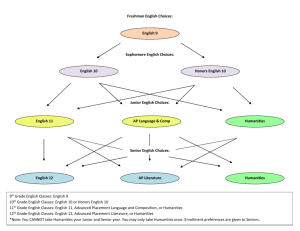ENGL 212 GEP Course Application Form
advertisement
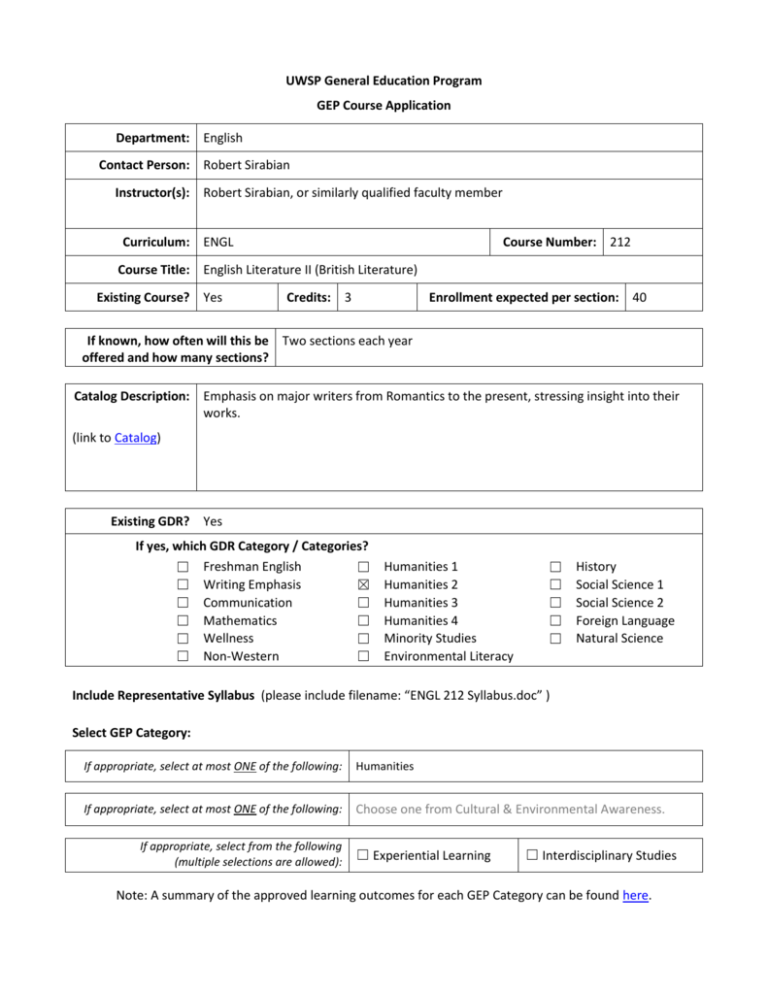
UWSP General Education Program GEP Course Application Department: English Contact Person: Robert Sirabian Instructor(s): Robert Sirabian, or similarly qualified faculty member Curriculum: ENGL Course Number: 212 Course Title: English Literature II (British Literature) Existing Course? Yes Credits: 3 Enrollment expected per section: 40 If known, how often will this be Two sections each year offered and how many sections? Catalog Description: Emphasis on major writers from Romantics to the present, stressing insight into their works. (link to Catalog) Existing GDR? Yes If yes, which GDR Category / Categories? ☐ Freshman English ☐ ☐ Writing Emphasis ☒ ☐ Communication ☐ ☐ Mathematics ☐ ☐ Wellness ☐ ☐ Non-Western ☐ Humanities 1 Humanities 2 Humanities 3 Humanities 4 Minority Studies Environmental Literacy ☐ ☐ ☐ ☐ ☐ History Social Science 1 Social Science 2 Foreign Language Natural Science Include Representative Syllabus (please include filename: “ENGL 212 Syllabus.doc” ) Select GEP Category: If appropriate, select at most ONE of the following: Humanities If appropriate, select at most ONE of the following: Choose one from Cultural & Environmental Awareness. If appropriate, select from the following (multiple selections are allowed): ☐ Experiential Learning ☐ Interdisciplinary Studies Note: A summary of the approved learning outcomes for each GEP Category can be found here. Course Learning Outcomes: Course Learning Outcomes: Analyze literature critically during class discussions and in writing to demonstrate an understanding of key themes, of the conventions/language of literature, and of key concepts about nineteenth- and twentieth-century British culture. Understand the features of literary texts and apply reading strategies when reading literature individually and during class discussions. Explain the reciprocal relationship between literature and culture— how literature and culture interact to reinforce and challenge social attitudes and values. Recognize the historical, social, and cultural contexts of British Romantic, Victorian, and Modern literature. Evaluate and engage literature as an imaginative expression of the human condition. (describe or attach) Explanation of Alignment: (explain how your course learning outcomes align with the GEP category outcomes) (GEP outcomes can be found here) How Student Learning will be Assessed: (describe or attach) Statement of Alignment The Course Learning Outcomes for English 212: English Literature II align with the GEP Humanities Learning Outcomes through the emphasis on the ways in which literature shapes culture (and vice versa), on developing an understanding of the human condition, and on the use of readings, discussion, and writing to engage British literature. Understanding nineteenth- and twentieth-century literary culture is an important focus of the course as well as how this culture is reflected factually and imaginatively in the literature. Most significantly, the reciprocal relationship between literature and culture—how each interacts with the other—is an important component in both sets of Learning Outcomes. As an imaginative engagement of the human condition, British literature allows students to make ethical, moral, and aesthetic evaluations of human situations and British culture. Finally, through reading individually, participating in class discussions, and completing written work, students will gain an understanding as well as an appreciation of British literature and culture. Matching and title identifications components of the midterm exam will measure a student’s basic knowledge of the readings through an ability to recognize works or key passages as well as general concepts and ideas about literary periods studied. Short answer questions and the analysis of identification passages will assess a student’s knowledge and comprehension of the reading, ability to synthesize his or her own ideas with those from class discussions, and ability to express coherent, focused responses in writing. After exams are graded and returned, I review student performance to assess the results of individual students as well as the results of the class as a whole. I use example responses from the exam during class to point out the strengths/weaknesses of responses and to review material for comprehension, with the goal of also looking ahead to future quizzes and the final exam. And I use these examples and overall performance data to prepare and plan for upcoming semesters. When time allows, I may have the class rewrite any question from the exam that needs review or further study as an assignment to close the learning loop. Individual students whose performances are weak or need extra help are invited or encouraged to attend office hours for individual help. Students whose performances are very strong will also be invited to attend office hours in order to discuss advanced strategies for improving writing and critical reading skills. Example Assignment: (describe or attach) Midterm Examination (50 mins/written exam)—See attachment (“ENGL 212 Midterm”). This exam will measure student learning at the midway point in the semester. It will indicate if students recognize key literary works and the British literary periods these works belong to as well as general concepts and ideas about literary periods studied (multiple choice and identifications). It will also indicate if students understand and can analyze key themes from the reading as well as literary conventions. Finally, it will indicate if students understand the key historical, social, and/or cultural contexts that shape the literature they have read (short answers and identifications). Because the exam is written, it will also indicate a student’s ability to focus and organize a written response as well as express ideas clearly and with sufficient detail. Library Resource 1. Have you contacted the Library about any additional resources (e.g., books, journals, and Services: DVDs, databases, streaming videos, etc.) needed for the proposed course? Yes < click here to contact Collection Development Librarian > 2. Would you be interested in discussing with a Librarian ways to support the research or information-literacy components of the proposed course? No < click here to contact the Coordinator of Library Instruction > Note: Approval of the course proposal does not imply availability of library resources. Department Vote: Approve: Enter# Oppose: Enter# Abstain: Enter# Date: Select date Next Steps / Please submit completed form to the Chairperson of the General Education Committee Instructions: General Education Committee Action: Click here to enter a date. To be entered by GEC.
